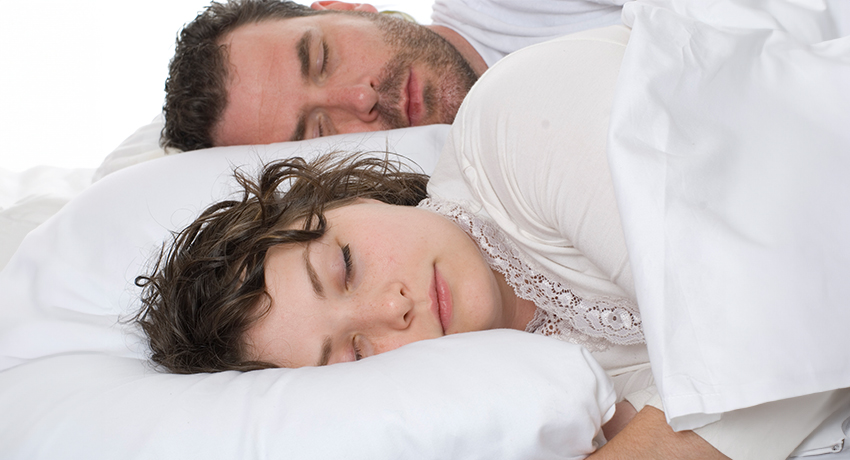Ever notice how an early riser tends to be married to a night owl?
Understanding sleep can be crucial for overall health, and men and women experience sleep differently. Biological factors impact sleep patterns, sleep quality, and even sleep disorders. There is a science behind many of the nuances regarding sleep that contribute to the divide.
Sleep quality
Contrary to popular belief, men and women need similar amounts of sleep, according to Reeba Mathew, MD, a sleep medicine specialist with UT Physicians Internal Medicine — Texas Medical Center. In general, Mathew said most people need seven to eight hours a night. However, there’s a critical difference in how sleep deprivation affects each individual.
“Women have more symptoms with sleep deprivation when compared to men,” said Mathew, associate professor of internal medicine at McGovern Medical School at UTHealth Houston. “They’re more sensitive to the consequences of sleep deprivation.”
Women’s sleep quality is also different, so Mathew emphasized how important it is for women to sleep seven to eight hours each night.
“Why is quality different? Women tend to multitask more with household chores and children,” she said. “Since they aren’t able to control the quality as much, women should certainly focus on getting adequate quantity of sleep.”
On the other hand, women tend to experience more deep sleep during the night, but this is paired with more awakenings and interruptions. Mathew said these are often related to environmental disturbances, lifestyle, and tasks they’ve taken on.
Sleep apnea
Sleep apnea is another example of sleep differences. While historically more prevalent in men (almost double the numbers), Mathew notes an important nuance. Women are often underdiagnosed for sleep apnea because they present differently and might be perceived as complaining.
“Men present more dramatically with loud snoring or choking episodes,” Mathew said. “Women have more subtle symptoms like feeling tired, fatigued, or experiencing mood changes.”
Women also need less pressure in a CPAP (continuous positive airway pressure) machine to treat sleep apnea than men. These machines provide a constant level of air pressure to keep the airways open during sleep.
Sleep patterns
In the world of sleep, women tend to be more of the morning type, while men tend to be night owls. Mathew said that frequently evens out as people get into their 50s and 60s because circadian rhythms advance a bit. In response, people often naturally go to bed earlier and wake up earlier.
Different life stages can create significant sleep disruptions for women.
- Women’s sleep quality is notably affected during pregnancy and postpartum.
- Menopause increases women’s risk of sleep apnea and can create more insomnia.
- Hormonal changes can impact women’s overall sleep architecture.
“After menopause, the risk of sleep apnea for women becomes equal to men’s,” Mathew said.
Mental health and sleep
Depression, which is generally more common in women, significantly impacts sleep.
Mathew said insomnia and depression are so closely connected providers can’t treat them separately. By the numbers, 40% of people with insomnia have clinical depression, and up to 80% of patients with depression have insomnia.
Sleep recommendations
Mathew offered universal advice for better sleep:
- Keep the bedroom temperature around 65-70 degrees Fahrenheit.
- Create a dark, quiet environment.
- Avoid intense exercise two to three hours before bedtime.
- Maintain consistent sleep schedules, even on weekends.
- Limit caffeine and avoid alcohol before bed.
“Our body should be winding down,” Mathew said. “Calming thoughts, meditation, or reading can help lower stress hormones.”
Although men and women share fundamental sleep needs, the nuances of how we experience sleep can differ dramatically. Understanding these differences can help individuals seek appropriate care and optimize their sleep health.


